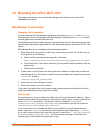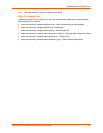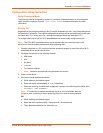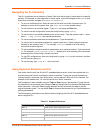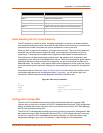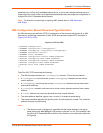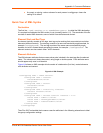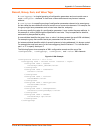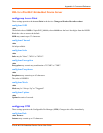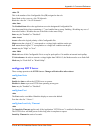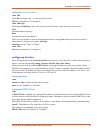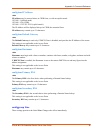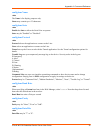
Appendix A: Command Reference
xPico® Wi-Fi® Embedded Device Server User Guide 74
parameters for a xPico Wi-Fi embedded device server, or it may only change the baud rate for a
single serial line. Using XCRs is a straightforward and flexible way to manage the configuration of
multiple XPico Wi-Fi embedded device servers.
Note: For directions on exporting or importing XML, please refer to XML Import and
XML Export.
XML Configuration Record Document Type Definition
An XML document type definition (DTD) is a description of the structure and content of an XML
document. It verifies that a document is valid. XCRs are exported using the DTD as shown in
Figure A-3 DTD for XCRs.
Figure A-3 DTD for XCRs
<!DOCTYPE configrecord [
<!ELEMENT configrecord (configgroup+)>
<!ELEMENT configgroup (configitem+,configgroup*)>
<!ELEMENT configitem (value+)>
<!ELEMENT value (#PCDATA)>
<!ATTLIST configrecord version CDATA #IMPLIED>
<!ATTLIST configgroup name CDATA #IMPLIED>
<!ATTLIST configgroup instance CDATA #IMPLIED>
<!ATTLIST configitem name CDATA #IMPLIED>
<!ATTLIST value name CDATA #IMPLIED>
]>
The xPico Wi-Fi DTD rules state the following:
The XML document element is a <configrecord> element. This is the root element.
A <configrecord> must have one or more <configgroup> elements and can have a
version attribute.
A <configgroup> must have one or more <configitem> elements and can have name
and instance attributes.
A <configitem> element must have one or more <value> elements and can have a name
attribute.
A <value> element can have only data and can have a name attribute.
The name attribute identifies a group, item, or value. It is always a quoted string.
The instance attribute identifies the specific option, like the serial port number. The "instance"
attribute is always a quoted string.
Note:
The name for each <configgroup> (specified with the name attribute) is the group
name listed in the Web Manager XCR groups or with the "xcr list" CLI command. See
the xPico Wi-Fi Embedded Device Server User Guide for more information about the
XCR groups.



